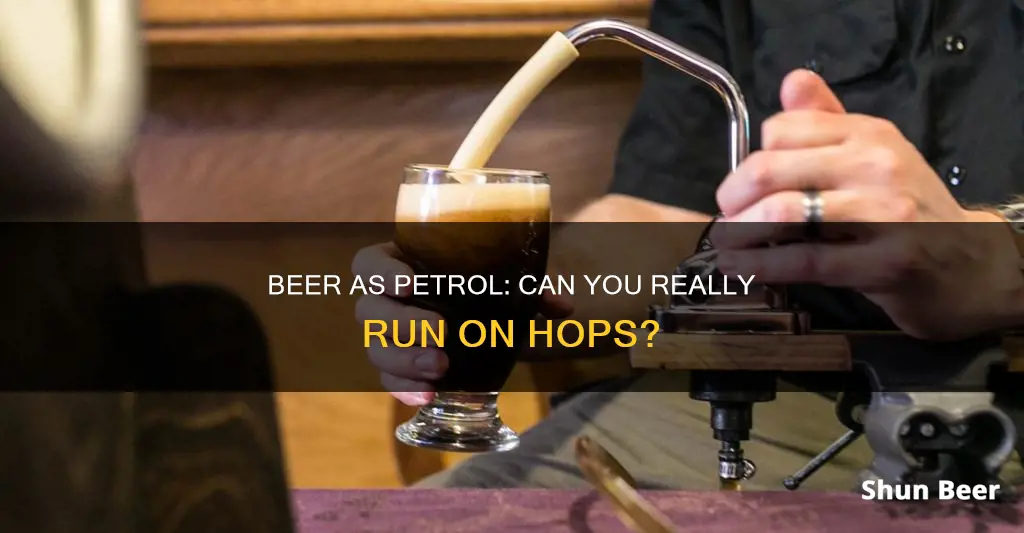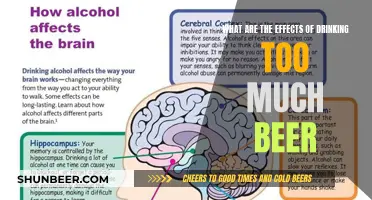
Scientists have been working on turning beer into fuel for several years. Chemists at the University of Bristol have made the first steps towards making sustainable petrol using beer as a key ingredient. The alcohol in alcoholic drinks is ethanol, which can be converted into butanol, a better fuel alternative. This technology has already been demonstrated in laboratory conditions with pure, dry ethanol, but it needs to work with real ethanol fermentation broths, which contain about 90% water and other impurities. The next step is to build a large-scale version of the technology, which could take up to five years. While beer won't be used on an industrial scale, the process shows that sustainable alternatives to fossil fuels are possible.
| Characteristics | Values |
|---|---|
| Beer as petrol | Beer can be converted into butanol, a better fuel alternative than ethanol |
| Beer's advantages over ethanol | Higher energy density, less corrosive to engines |
| Ethanol's drawbacks | Lower energy density, mixes too easily with water, corrosive to engines |
| Ethanol's advantages | Already used as an alternative to petrol, can be made from grass, wood, and agricultural waste |
| Ethanol's drawbacks | Bad for cold-starting, pure ethanol could damage car engines |
| Butanol's advantages | Can be used with current petrol cars with no or very little modification |
| Scaling up beer-to-butanol technology | Could take up to five years |
What You'll Learn

Ethanol is not an ideal replacement for petrol
While beer can be converted into fuel, ethanol is not an ideal replacement for petrol.
Firstly, ethanol has a lower energy density than petrol. This means that it is less efficient in terms of the amount of energy it can produce compared to petrol. Secondly, ethanol has a tendency to mix too easily with water. This can be problematic as water can dilute the ethanol and reduce its effectiveness as a fuel. Additionally, the presence of water can also lead to corrosion and damage to engines over time.
Furthermore, producing ethanol, especially from corn, has been the subject of debate. Some argue that it takes more energy to grow the corn and produce ethanol than the energy that is obtained from burning it. This process may also have negative environmental impacts, such as soil erosion and the use of fertilizers, pesticides, and herbicides. While new technologies are being developed to improve the sustainability of ethanol production, such as using cellulosic technology to convert farm waste or fibrous plants into ethanol, these methods are still in the early stages of development and may be costly to implement.
In conclusion, while ethanol can be used as a fuel and may offer some advantages in terms of reducing reliance on foreign oil and supporting farmers, it is not a perfect substitute for petrol due to its lower energy density, corrosive nature, and the environmental impacts associated with its production. Further research and development are needed to improve the sustainability and efficiency of ethanol as a fuel source.
Antibiotics and Beer: A Safe Mix?
You may want to see also

Butanol is a better alternative to ethanol
While ethanol is the most widely used biologically generated fuel, it is not an ideal replacement for petrol. Ethanol has a lower energy density, it mixes too easily with water, and can be corrosive to engines.
Butanol is also more hydrophobic than ethanol, making it compatible with the existing fuel infrastructure and pipelines. This addresses the transport and storage issues posed by ethanol, which cannot be easily piped due to its low density and hydrophilic nature.
The main challenge in adopting butanol as a fuel source is the development of an efficient, high-yield, and commercially available production process. Butanol is difficult to make from sustainable sources, and the current conversion processes from ethanol to butanol are expensive and time-consuming. However, research teams from the University of Rochester and the University of Bristol's School of Chemistry have been working on improving the conversion process, with some success.
Beer Fast: Does It Work Quickly?
You may want to see also

Beer is a good model for industrial ethanol fermentation broths
Scientists from the University of Bristol have been working towards finding sustainable alternatives to fossil fuels for transportation. One of the most widely used sustainable alternatives to petrol is bioethanol, which is often blended with gasoline in the United States. However, ethanol has its drawbacks, including lower energy density, a tendency to mix with water, and corrosiveness to engines.
A better alternative to ethanol is butanol, which does not share many of ethanol's drawbacks. However, butanol is challenging to produce from sustainable sources. This is where beer comes in. The alcohol in alcoholic drinks, including beer, is ethanol—the same molecule that can be converted into butanol as a petrol replacement.
Beer is an excellent model for industrial ethanol fermentation broths because ethanol for fuel is made using a brewing process. If the technology to convert ethanol into butanol can work with beer, it demonstrates that it can be scaled up to make butanol as a petrol replacement on an industrial scale. Beer is a readily available and chemically similar model to the ethanol fermentation broths used in fuel production, making it an ideal testing ground for this technology.
The technology used to convert ethanol into butanol is called a catalyst. Catalysts are chemicals that can speed up and control chemical reactions and are already widely used in the petrochemical industry. The University of Bristol team's key finding is that their catalysts successfully convert beer, or more specifically, the ethanol in beer, into butanol. This is a significant step forward in the quest for sustainable transportation fuel.
Beer's Blood-Thinning Effect: Myth or Reality?
You may want to see also

Beer can be converted into butanol using a catalyst
Scientists from the University of Bristol's School of Chemistry have been working towards converting beer into fuel. They have developed a technology that can convert the ethanol in beer into butanol using a catalyst.
Catalysts are chemicals that can speed up and control a chemical reaction. They are already widely used in the petrochemical industry. The Bristol team's key finding is that their catalysts will convert beer into butanol. This is significant because it shows that the technology can work with a 'real' ethanol mixture, which is an important step in scaling up the technology for industrial application.
The alcohol in alcoholic drinks is ethanol, which is the same molecule that can be converted into butanol as a petrol replacement. Alcoholic drinks are, therefore, an ideal model for industrial ethanol fermentation broths. Ethanol for fuel is made using a brewing process, so beer is a good test for this technology.
While beer would not be used on an industrial scale due to the potential impact on food crops, the successful conversion of beer into butanol demonstrates that this technology can work with a similar ethanol mixture. This brings the possibility of using butanol as a petrol replacement one step closer to reality.
Morning Beer: Should You Drink Before Work?
You may want to see also

Butanol could be a sustainable replacement for petrol
Butanol: A Sustainable Replacement for Petrol
The need for sustainable alternatives to fossil fuels is urgent, and one of the most widely used sustainable alternatives to petrol is bioethanol. However, ethanol is not an ideal replacement due to its lower energy density, tendency to mix with water, and corrosiveness to engines. Butanol, on the other hand, is a much better fuel alternative. It has a higher energy density, does not mix as easily with water, and is less corrosive.
Butanol Production Challenges
While butanol is a superior fuel alternative, it is challenging to produce from sustainable sources. The current methods of butanol production rely on fossil fuels, which are non-renewable and contribute to climate change. Additionally, the microbial production of butanol is not cost-competitive due to low yields and the expense of separating butanol from the fermentation process.
Catalytic Conversion of Ethanol to Butanol
Scientists from the University of Bristol's School of Chemistry have been working on a solution to these challenges. They have developed technology that uses catalysts to convert widely-available ethanol into butanol. This process has been successfully demonstrated in laboratory conditions with pure, dry ethanol. The next step is to scale up the technology so that it can work with real ethanol fermentation broths, which contain about 90% water and other impurities.
Advantages of the Catalytic Approach
The catalytic approach to butanol production offers several advantages. Firstly, alcoholic drinks like beer are an ideal model for industrial ethanol fermentation broths, so using beer as a test material shows that the technology has the potential to be scaled up for industrial butanol production. Additionally, this approach is similar to many existing petrochemical processes, which could make it easier to implement.
Butanol is a promising sustainable replacement for petrol, offering higher energy density and reduced corrosiveness. While challenges remain in producing butanol from sustainable sources, the catalytic conversion of ethanol shows potential as a scalable and efficient solution. Further research and development are needed to optimize the process and bring it to industrial application.
Hoppy Beers: The Secret to Better Beer Bread?
You may want to see also
Frequently asked questions
Beer has been used to create a renewable fuel source to replace petrol. Chemists at the University of Bristol have developed a method to convert ethanol in beer into butanol, which is a better fuel source.
Beer can be used to create a sustainable alternative to petrol. However, the process is not yet ready for large-scale production. The technology to convert ethanol into butanol still needs to be developed to work with real ethanol fermentation broths, which contain about 90% water and other impurities.
Using beer as fuel would reduce reliance on petrol and provide a more sustainable alternative. Beer is also an excellent model for the mixture of chemicals needed in a real industrial process.
One downside is that it would take a lot of beer to fill up a car's tank. Professor Duncan Wass points out that the current process can only produce a few hundred grams of butanol from beer, which is not enough to fill a car's tank. Another is that ethanol is bad for cold-starting as it doesn't burn as quickly as gasoline, so it wouldn't be ideal for use in winter.







